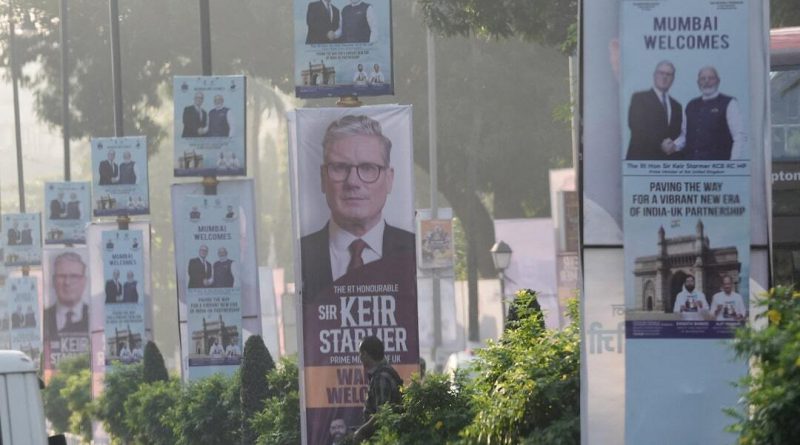UK PM Starmer Champions Swift India Trade Deal to Boost Bilateral Business and Growth
Mumbai — British Prime Minister Keir Starmer emphasized the importance of implementing the recently signed UK-India free trade agreement as quickly as possible during his two-day visit to India on Wednesday.
Accompanied by over 100 leaders from business, culture, and academia, Starmer’s visit underscores the UK government’s commitment to strengthening international trade ties and expanding economic opportunities for British companies in one of the world’s fastest-growing markets.
The UK-India trade agreement, signed in July during Indian Prime Minister Narendra Modi’s visit to the UK, aims to reduce tariffs on a wide range of goods including textiles, whisky, and automobiles, while granting greater market access for businesses on both sides.
This deal represents a significant step in post-Brexit trade policy for the UK, positioning Britain to capitalize on the immense potential of India’s rapidly expanding consumer market and industrial base.
Addressing delegates from the trade mission in Mumbai, Starmer highlighted the urgency of implementing the deal, stating that he had instructed his team to make it effective as “quickly as humanly possible.” He emphasized that the agreement offers huge opportunities for British companies and serves as a platform to strengthen bilateral economic relations.
“Our job is to make it easier for you to seize these opportunities,” Starmer told attendees, signaling the UK government’s hands-on approach to facilitating trade and investment.
The trade pact, which took three years of meticulous negotiations to finalize, is projected to increase bilateral trade by at least £25.5 billion ($34 billion) by 2040, according to government estimates.
Officials stressed that these projections represent a baseline, with the potential for even greater economic growth as businesses take full advantage of tariff reductions and expanded market access. Industries across energy, aerospace, telecommunications, and consumer goods are expected to benefit from reduced barriers, fostering stronger business partnerships and increased exports.
Starmer’s visit also provides a platform for bilateral discussions with PM Modi, aimed at ratifying the deal and bringing it into effect within the next year. Both governments are focused on ensuring a smooth and efficient implementation process, with an emphasis on creating tangible benefits for companies, workers, and consumers in both countries.
The Prime Minister’s focus on growth comes at a critical time as he seeks to reinforce the UK economy and restore confidence in the business sector. Starmer’s delegation included executives from major firms such as BP, Rolls-Royce, and BT, reflecting the diversity of industries that stand to gain from enhanced trade ties with India.
By fostering a collaborative environment, the UK government is encouraging companies to innovate, invest, and expand internationally.
Business groups have welcomed Starmer’s proactive approach. Shevaun Haviland, Director General of the British Chambers of Commerce, praised the emphasis on growth and international engagement, noting that trade agreements with India and other regions, including the Gulf, are critical for long-term economic prosperity.
She emphasized the importance of maintaining a business-friendly environment, including careful consideration of tax policy, to complement these international initiatives.
Experts note that the UK-India trade deal not only strengthens bilateral commerce but also positions the UK as a global trade leader capable of navigating a complex international landscape, including ongoing negotiations to reduce tariffs and manage global trade tensions.
The agreement is expected to drive innovation, create jobs, and increase market access for a wide range of sectors.
Prime Minister Starmer’s visit highlights the UK’s strategic vision for sustainable economic growth and international collaboration.
By moving swiftly to implement the trade deal, the UK is sending a strong message that it is committed to building resilient business ties, supporting domestic industries, and leveraging global opportunities.
As Britain and India work together to translate the agreement into actionable results, the trade deal promises a bright future for businesses, consumers, and investors alike, reinforcing the potential for economic growth, innovation, and strengthened bilateral relations between the two nations.



